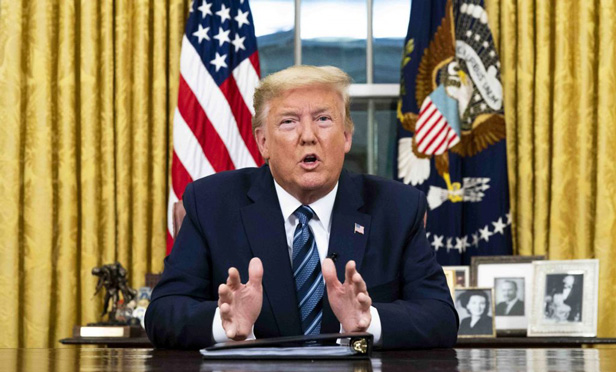 (Photo: Doug Mills/The New York Times/Bloomberg)
(Photo: Doug Mills/The New York Times/Bloomberg)
Spurred by President Donald Trump's threats on Monday to use executive orders to achieve some economic stimulus, lawmakers could reach a deal by Friday, when their summer recess is scheduled to start, according to Greg Valliere, chief U.S. policy strategist for AGF Investments.
During a press briefing late Friday afternoon, Trump said he could use executive orders to extend eviction relief as well as instruct the Internal Revenue Service not to collect the payroll tax.
Recommended For You
"It's unclear" if Trump can actually do these things through executive action, "but the negotiators needed a wakeup call," Valliere said.
The current sticking points: aid to state and local governments for the Democrats, and business liability protection for the GOP, Valliere said. However, both sides will likely be "close to a deal" by Friday, with a final package winning approval sometime next week.
House Speaker Nancy Pelosi, D-Calif., said during a Monday afternoon press briefing that she and Senate Minority Leader Chuck Schumer, D-N.Y., had a "productive" two-hour meeting with Treasury Secretary Steven Mnuchin and White House Chief of Staff Mark Meadows. "We're moving down the track," Pelosi said, but "we still have our differences."
Schumer added that "We are really getting an understanding of each side's position," and "moving closer together" on certain issues. A lot of issues "are still outstanding," Schumer added, "but I think there is a desire to get something done as soon as we can."
Senate Majority Leader Mitch McConnell, R-Ky., tweeted Tuesday that "Senate Republicans proposed a major rescue package: a trillion dollars for kids, jobs, and healthcare. But Democrats are blocking it all. The American people need a bipartisan outcome, not Democrats' stonewalling behind closed doors."
Issues that have been resolved, according to Valliere, include about $100 billion for colleges and K-12 schools, another round of $1,200 checks to most Americans, and more funding for hospitals and Covid-19 testing.
"The strong consensus for these provisions ultimately will prod negotiators to compromise on other issues," Valliere opined.
Valliere sees a "70-30 chance of a bill, hardly a slam dunk, with plenty of potholes lurking—including the reluctance of many Republicans to go any higher than a $1 trillion price tag."
Democrats have floated the $3 trillion Health and Economic Recovery Omnibus Emergency Solutions (Heroes) Act—which passed the House in May—while Republicans introduced on July 27 the $1 trillion Health, Economic Assistance, Liability Protection, and Schools (HEALS) Act.
Valliere said "$1.5 trillion still looks like the ceiling" for the next stimulus bill, "which will prompt howling from House progressives, who want far more."
From: ThinkAdvisor
© 2025 ALM Global, LLC, All Rights Reserved. Request academic re-use from www.copyright.com. All other uses, submit a request to [email protected]. For more information visit Asset & Logo Licensing.




